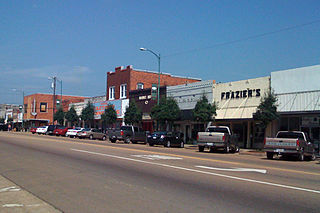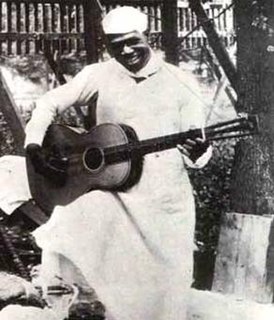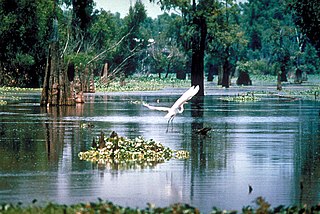Related Research Articles

The Mississippi River is the second-longest river and chief river of the second-largest drainage system on the North American continent, second only to the Hudson Bay drainage system. From its traditional source of Lake Itasca in northern Minnesota, it flows generally south for 2,320 miles (3,730 km) to the Mississippi River Delta in the Gulf of Mexico. With its many tributaries, the Mississippi's watershed drains all or parts of 32 U.S. states and two Canadian provinces between the Rocky and Appalachian mountains. The main stem is entirely within the United States; the total drainage basin is 1,151,000 sq mi (2,980,000 km2), of which only about one percent is in Canada. The Mississippi ranks as the fourth-longest river and fifteenth-largest river by discharge in the world. The river either borders or passes through the states of Minnesota, Wisconsin, Iowa, Illinois, Missouri, Kentucky, Tennessee, Arkansas, Mississippi, and Louisiana.

Louisville is a city in Winston County, Mississippi. The population was 6,631 at the 2010 census. It is the county seat of Winston County.

"When the Levee Breaks" is a country blues song written and first recorded by Kansas Joe McCoy and Memphis Minnie in 1929. The lyrics reflect experiences during the upheaval caused by the Great Mississippi Flood of 1927.

The Great Mississippi Flood of 1927 was the most destructive river flood in the history of the United States, with 27,000 square miles (70,000 km2) inundated up to a depth of 30 feet (9 m). To try to prevent future floods, the federal government built the world's longest system of levees and floodways.

The Great Flood of 1993 was a flood that occurred in the Midwestern United States, along the Mississippi and Missouri rivers and their tributaries, from April to October 1993. The flood was among the most costly and devastating to ever occur in the United States, with $15 billion in damages. The hydrographic basin affected over around 745 miles (1,199 km) in length and 435 miles (700 km) in width, totaling about 320,000 square miles (830,000 km2). Within this zone, the flooded area totaled around 30,000 square miles (78,000 km2) and was the worst such U.S. disaster since the Great Mississippi Flood of 1927, as measured by duration, area inundated, persons displaced, crop and property damage, and number of record river levels. In some categories, the 1993 flood even surpassed the 1927 flood, at the time the largest flood ever recorded on the Mississippi.

James Charles Rodgers was an American singer-songwriter and musician who rose to popularity in the late 1920s. Widely regarded as "the Father of Country Music", he is best known for his distinctive rhythmic yodeling. Unusual for a music star, Rodgers rose to prominence based upon his recordings, among country music's earliest, rather than concert performances – which followed to similar public acclaim.
Lum v. Rice, 275 U.S. 78 (1927), is a United States Supreme Court case in which the Court held that the exclusion on account of race of a child of Chinese ancestry from a state high school did not violate the Fourteenth Amendment to the United States Constitution. The decision effectively approved the exclusion of minority children from schools reserved for whites.
"Ol' Man River" is a show tune from the 1927 musical Show Boat that contrasts the struggles and hardships of African Americans with the endless, uncaring flow of the Mississippi River. It is sung from the point of view of a black stevedore on a showboat, and is the most famous song from the show. The song is meant to be performed in a slow tempo, it is sung complete once in the musical's lengthy first scene by the stevedore "Joe" who travels with the boat, and, in the stage version, is heard four more times in brief reprises. Joe serves as a sort of musical one-man Greek chorus, and the song, when reprised, comments on the action, as if saying, "This has happened, but the river keeps rolling on anyway."

The Egg Bowl is the name given to the Mississippi State–Ole Miss football rivalry. It is an American college football rivalry game played annually between Southeastern Conference members Mississippi State University and Ole Miss. The rivalry is the tenth longest uninterrupted series in the United States. The two teams first played each other in 1901. Since 1927 the winning squad has been awarded possession of the "Golden Egg Trophy." In cases where the game ended in a tie the previous winner retained possession of the trophy. Ole Miss leads the series 62–46–6 through the 2019 season.

Robert Hicks, better known as Barbecue Bob, was an early American Piedmont blues musician. His nickname was derived from his working as a cook in a barbecue restaurant. One of the two extant photographs of him show him playing a guitar and wearing a full-length white apron and cook's hat.

The Atchafalaya Basin, or Atchafalaya Swamp, is the largest wetland and swamp in the United States. Located in south central Louisiana, it is a combination of wetlands and river delta area where the Atchafalaya River and the Gulf of Mexico converge. The river stretches from near Simmesport in the north through parts of eight parishes to the Morgan City southern area.

Bernard W. Bierman was an American football player and coach of football and basketball. He coached from 1919 to 1950 except for a span during World War II when he served in the U.S. armed forces. Bierman was the head coach at the University of Montana (1919–1921), Mississippi State University (1925–1926), Tulane University (1927–1931), and his alma mater, the University of Minnesota, compiling a career college football record of 153–65–12. At Minnesota, Bierman's Golden Gophers compiled a 93–35–6 record, won five national championships and seven Big Ten Conference titles, and completed five undefeated seasons. Bierman was also the head basketball coach at Montana (1919–1922), Mississippi State (1925–1927), and Tulane (1928–1930), tallying a career college basketball mark of 89–51.

Thomas Clendinen Catchings was a U.S. Representative from Mississippi.

Mississippi is a state located in the southeastern region of the United States. Mississippi is the 32nd largest and 34th-most populous of the 50 United States. Mississippi is bordered to the north by Tennessee, to the east by Alabama, to the south by the Gulf of Mexico, to the southwest by Louisiana, and to the northwest by Arkansas. Mississippi's western boundary is largely defined by the Mississippi River. Jackson is both the state's capital and largest city. Greater Jackson, with an estimated population of 580,166 in 2018, is the most populous metropolitan area in Mississippi and the 95th-most populous in the United States.

The 1927 College Football All-Southern Team consists of American football players selected to the College Football All-Southern Teams selected by various organizations in for the 1927 Southern Conference football season.
The 1927 Mississippi A&M Aggies football team represented the Mississippi A&M Aggies of Agricultural and Mechanical College of the State of Mississippi during the 1927 Southern Conference football season.

The 1927 Mississippi gubernatorial election took place on November 8, 1927, in order to elect the Governor of Mississippi. Incumbent Democrat Dennis Murphree, as he had not served a full term, was eligible for and ran for election. As was common at the time, the Democratic candidate ran unopposed in the general election so therefore the Democratic primary was the real contest, and winning the primary was considered tantamount to election.
The presidency of Calvin Coolidge began on August 2, 1923, when Calvin Coolidge became President of the United States upon the sudden death of Warren G. Harding, and ended on March 4, 1929.

The 1927–28 Auburn Tigers men's basketball team represented Auburn University in the 1927–28 college basketball season. The team's head coach was Mike Papke, who was in his third season at Auburn. The team played their home games at Alumni Gymnasium in Auburn, Alabama. They finished the season 20–2, 12–1 in SoCon play to win the SoCon regular season championship. They defeated Clemson, Georgia Tech, and Mississippi A&M to advance to the championship game of the Southern Conference Tournament where they lost to Mississippi.
William Herschel Bobo was a minor league baseball player and an American football, basketball, and baseball coach. He served as the head football coach at Mississippi State Teachers College—now known as the University of Southern Mississippi—from 1924 to 1927, compiling a record of 9–17–4. Bobo was also the head basketball coach at Mississippi State Teachers from 1924 to 1928, tallying a mark of 31–17–1, and the school's head baseball from 1925 to 1928, amassing a record of 19–10–1.
References
- ↑ Barner, William G.; McKenzie, Danny (2010). The Egg Bowl: Mississippi State Vs. Ole Miss. Univ. Press of Mississippi. p. 76. ISBN 978-1-61703-074-1.
- ↑ "Spears Given Highest Vote in Selection". Sarasota Herald-Tribune. November 27, 1927.